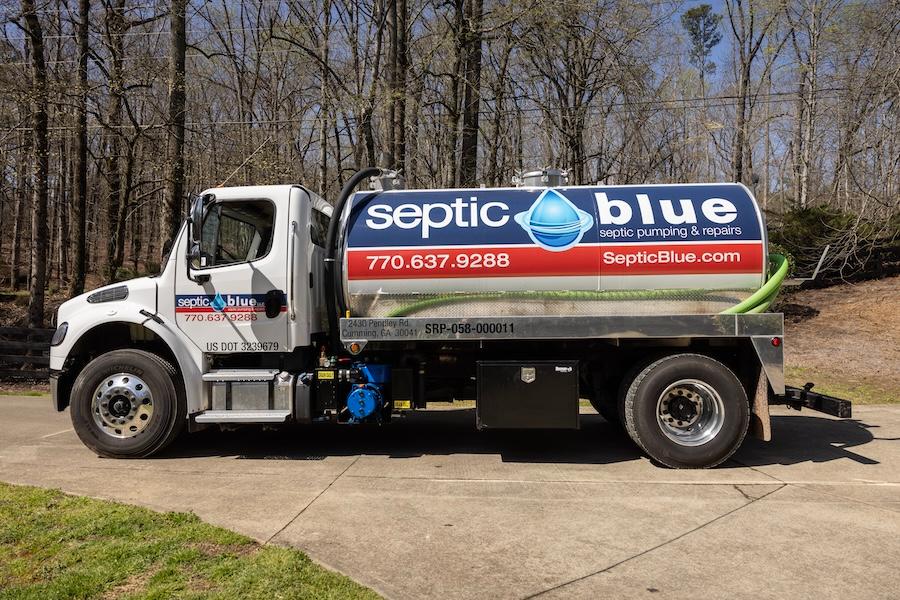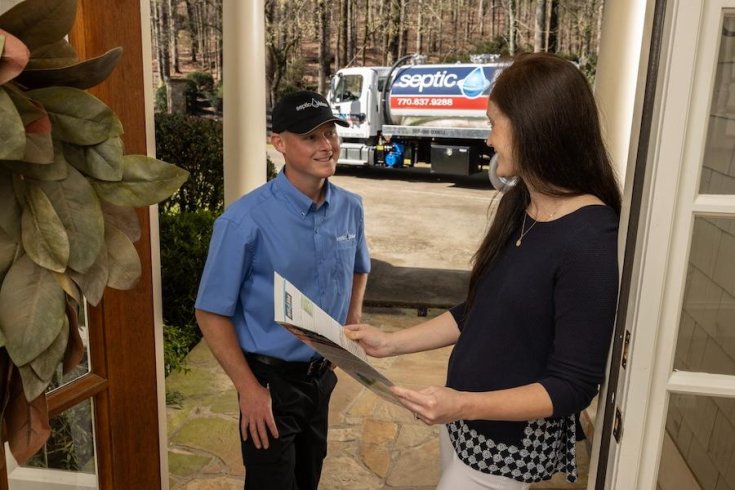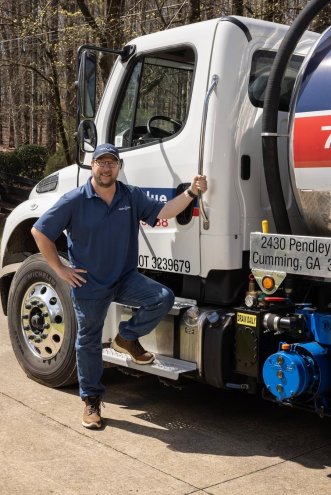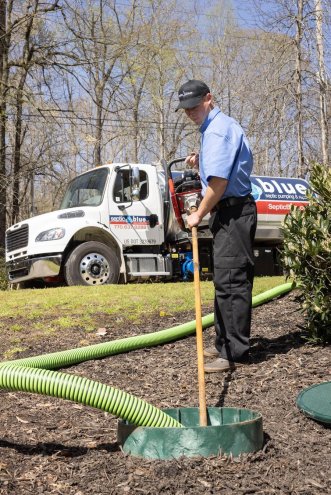Interest Free Financing Up To 36 Months
WE DO NOT ONLY PUMP YOUR TANK - WE CLEAN IT!
Multiple Financing Options Are Available Up To 36 Months
Interest Free Financing Up To 36 Months
WE DO NOT ONLY PUMP YOUR TANK - WE CLEAN IT!
Multiple Financing Options Are Available Up To 36 Months

Homeowners usually think about their roof, HVAC system, or plumbing before they ever consider the septic tank. Yet the septic system handles every gallon of wastewater leaving the house. When it runs well, nobody notices. When it fails, everything stops. Septic Blue knows that pumping and cleaning aren’t that glamorous, but they are important for having a healthy home. If you want to avoid expensive repairs and keep your system working, keep reading.
Every septic system has a natural rhythm. Wastewater flows in, solids settle, and liquid exits into the drain field. Over time, the solids build up. Once that layer gets too high, the system can no longer separate properly. Drains might start running more slowly. An odor may appear near the yard where the tank is buried. Sometimes toilets require more than one flush, or gurgling sounds echo from the pipes. Another reliable clue comes from the lawn itself. If the grass above the drain field looks brighter and thicker than the rest of the yard, it can mean liquid waste is rising closer to the surface. Inside the house, backups are the final red flag. If wastewater comes back up in tubs, sinks, or showers, the tank is overdue for service. Most tanks need pumping every three to five years, depending on household size and water use. Families with larger homes or heavy laundry and dishwasher use may need it sooner.

We keep our pricing simple. There are no hidden fees or surprise charges. We explain what the job involves and what it will cost before we begin. That’s how we do business and how we build trust with every customer.

Soil type, system age, tank size, and household habits all factor into how your system performs. Our technicians are trained to assess and adapt to each unique situation. We won’t cut corners, and we don’t rush. We’ll take the time to do it right.

When you’re dealing with a septic emergency, you need help fast. We respond quickly to urgent calls and provide the service you need. Whether it’s a flooded yard or a backed-up toilet, we’ll work to restore your system as soon as possible.

We want to help you maintain a system that works year after year, which is why we offer honest recommendations, maintenance tips, and custom service plans.

Delaying septic pumping does not save money. It shifts small costs into large ones. When solids overflow into the drain field, the soil becomes clogged and loses its ability to filter wastewater. At that point, pumping alone cannot fix the issue. The entire drain field may need replacement, which can run into thousands of dollars. Backups can bring wastewater into living spaces, which creates health risks. Bacteria, viruses, and household chemicals in sewage can contaminate flooring and surfaces. Cleanup requires professional sanitation, and sometimes flooring or drywall must be removed. The tank itself can also suffer damage. Without routine cleaning, grease, sludge, and scum harden along the walls and shorten the life of the tank. What should have been a routine maintenance appointment every few years turns into a system replacement decades early. Ignoring service also risks drawing the attention of local authorities. If wastewater rises to the surface of the yard, it can be considered a public health hazard that can lead to complaints or fines.
Even in communities where many homes use septic systems, several myths still circulate. One common belief is that additives poured down the drain can replace pumping. While some products claim to break down waste, they cannot remove the layers of solids that settle at the bottom of the tank. Pumping is the only way to clear them out. Another myth is that a system lasting without problems for ten years does not need service. In reality, the lack of visible issues usually means solids are slowly building without detection. By the time symptoms appear, damage is already underway. Preventive pumping is always cheaper than reactive repairs. Some homeowners also believe that septic systems handle anything that fits down a drain. That is a costly assumption. Items like wipes, feminine products, grease, and harsh chemicals damage the balance of bacteria that keeps the tank working. They also increase the buildup of material that leads to clogs. Treating the system carefully between pumping appointments extends its lifespan and reduces emergencies.
The most effective way to care for a septic system is to create a simple schedule and stick to it. Start with the size of your tank. Most homes have tanks between 1,000 and 1,500 gallons. For an average family, that means pumping about every three to four years. Larger families may shorten that to two years, while smaller households may stretch it to five. Once you know your interval, mark it on a calendar or set a digital reminder. Keeping written records of each service also helps. If you ever sell the home, buyers appreciate proof that the system was maintained. This record also allows the technician to note the tank’s condition over time. It’s also a good idea to get an inspection. A technician can check the baffles, measure sludge levels, and make sure the tank is structurally sound. If problems are caught early, repairs are usually simple and affordable. Pairing inspections with pumping creates a full picture of the system’s health.
A septic system is one of the most important parts of a home, yet it is normally forgotten until trouble appears. Staying ahead with regular pumping and cleaning prevents backups, protects the drain field, and keeps your household running. Choosing a professional team that understands local soil and system types will make sure the job is done safely. Septic Blue provides reliable service for homeowners in Fuquay Varina, North Carolina, and the surrounding area. When you’re ready to protect your home, schedule your septic pumping with us today.

Hiring a septic company in Raleigh, NC involves more than comparing prices or scheduling the earliest appointment. Septic pumping, cleaning,…

A septic system is designed to move wastewater efficiently from your home into a tank and then into the drain field.…
.webp)
Even if it often fades into the background of daily life, a septic system plays a critical role in keeping your…

Septic systems play a critical role in protecting your home, health, and surrounding environment. Unfortunately, they're often misunderstood as systems that…